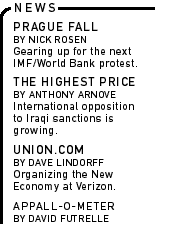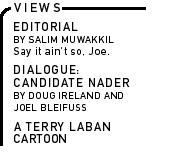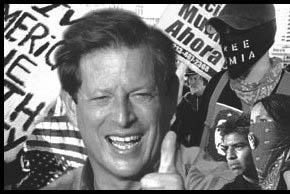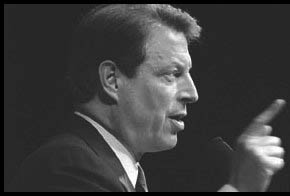 |

|

|

|

|
| |
 |
|
|
In the end, Al Gore came back home, back to the bedrock populism that has been the strength of the Democratic Party, back to a political perspective that might have pleased his father - a border-state senator who opposed the Vietnam War and supported civil
"If he takes a populist tone and hammers on the issues, then we'll win," Rep. Jan Schakowsky, a progressive from Illinois had said hopefully before his speech. "People want to hear he's on their side." This strategy could lift the sagging Gore campaign if he pursues it with conviction until November. Despite the strong economy, there is deep popular discontent. Polls indicate that voters are almost evenly divided on whether the country is on the right track. They also think the wealthy and big corporations have prospered in recent years, but not everyone else - a fairly accurate perception. They are looking for improvements in education, health care and retirement security rather than tax cuts. Gore's promises to stand up to powerful interests such as "big tobacco, big oil, the big polluters, the pharmaceutical companies, the HMO's," and to "work for you every day" and "never let you down" could be a powerful message. If people believe it. "The trouble with Al Gore," quips comedian Will Durst, "is that I believe a lot of what he says - until he says it." Gore's credibility problem has less to do with his personality than with history. He may be intelligent, erudite and experienced, but he has hardly distinguished himself as a consistent partisan of "working families." Nonetheless, although he lacks the folksy charm that allows Clinton to appear to be a man of the people, Gore did come across in his acceptance speech as earnest, well-intentioned and even a little humble, making the case that the presidential election was not a popularity contest but "a day-by-day fight for the people." Leading up to the convention, it had looked like Gore was preparing to fight the election on Republican theocratic turf, forming a ticket with Connecticut Sen. Joseph Lieberman that seemed more ready to do battle with Satan than with big corporations. Lieberman himself once had a reputation as a fighter - for civil rights and later for consumer protections - but more recently he had become a critic of affirmative action and a willing servant of his state's big insurance companies. The veep choice also underscored the connection that both men have to the Democratic Leadership Council (DLC), the corporate-funded faction of the party that is ardently pro-business and equally hostile to any policies that would regulate business or redistribute wealth and income. Similarly, Gore's pledge to reform campaign finance - while vastly superior to Bush's determination to give money more influence over politics - runs up against both his recent history as an especially aggressive fundraiser and the overwhelming corporate funding evident at the convention itself. "This convention is all about money, and especially corporate money," Wisconsin Sen. Russell Feingold told the dissident Shadow Convention. Yet despite Gore's admission that he is an "imperfect messenger" of campaign finance reform, Feingold hopes Gore will make it a central issue in the campaign. The clash of corporate influence and Gore's populist credibility recurs time and again. For example, he promised to "honor equal rights and fight for an equal day's pay for an equal day's work." Yet Gore, like the administration in which he served, has been unwilling to champion the key working women's legislative demand - equal pay for work of comparable worth. It's a winner with women of all income levels, whose support Gore desperately needs, but it also has strong support from men, who recognize that their families would benefit from their wives bringing home more money. But after years of unsuccessfully pleading for support, Gail Shaffer of Business and Professional Women/USA has concluded that the Clinton/Gore administration held back because they were only willing to cross big corporations on a few issues at a time. This is hardly an example of making hard decisions to do the right thing against powerful interests, as Gore has promised to do. In a fleeting reference to one of the most divisive issues among Democrats, Gore argued for "fair trade," saying that "we must set standards to end child labor, to prevent the exploitation of workers and the poisoning of the environment." It was broadly, if mildly, in tune with the views of organized labor - as well as the majority of Americans. Clinton had promised the same when he first ran for president - but did nothing to implement the idea. It may not be popular with the big corporate donors to the party, but if the administration had taken the pledge to protect workers rights and the environment seriously, Gore would not be in such bad shape in the polls now. The list of hypocrisies and discrepancies between Gore's populist campaign message and his political record could go on and on. But ultimately it is good that he has decided to run his campaign as a populist. Although there were still plenty of "New Democrat" flourishes - like emphasizing debt reduction, attacking popular culture and
Gore's decision to be a working-class tribune is an implicit recognition that he has weak support even among traditional Democrats. To the extent that Gore relies on progressive movements and working-class voters, he may also be more beholden to them if he wins. Although they argued that Gore would be more easily influenced than Bush, leaders of the party's left-wing, such as Rev. Jesse Jackson and Los Angeles mayoral contender Antonio Villaraigosa, argued in meetings at the convention that the prospects for progressive policies depend ultimately on strengthening popular movements. The New Democrats, most analysts argue, helped the party neutralize Republican attacks on liberalism by being tough on crime, urging elimination of welfare, emphasizing personal responsibility and favoring budgetary restraint. While that tactic has been successful, to judge from opinion polls, it has often taken its toll (reinforcing the destructive war on drugs, expanding the death penalty and settling for an overly harsh and unsupportive version of welfare reform). On other counts, such as supporting corporate-friendly trade deals, the New Democrats have increased their fundraising but alienated voters. Apart from the merit of any individual New Democrat policy idea - and many are acceptable to progressives - there are some fundamental weaknesses in their strategy. As Ruy Teixeira and Joel Rogers argue in their new book, America's Forgotten Majority, what at first appealed as a way of providing tactical political cover for preserving core Democratic values, became an increasingly conservative strategy of moving away from government intervention in the economy on behalf of working people. In 1992, Clinton talked of balancing rights and responsibilities for everyone. But in practice his demand for accountability and responsibility applied mainly to the poor, not corporations. Since the "third way" is defined mainly as an alternative to liberalism and conservatism, it simply moves debate to the right, while undermining any alternative on the left. Yet for a political philosophy that was designed primarily as a way to succeed electorally, the most damning indictment of the New Democrat approach is that the Democrats have lost ground in the House, Senate, state legislatures and governorships since Clinton was elected. Furthermore, the comeback in Congress after 1994 was largely a result of more vigorous defense of "old Democrat" programs, like the minimum wage and Social Security - as well as aggressive mobilization by the labor movement, which is often at odds with New Democrat proposals. The New Democrat approach was developed in an era when budget deficits constrained political ambition, but the continuing economic squeeze on most working-class families combined with the prospect of budget surpluses has opened up new opportunities for dramatic initiatives. At a panel discussion sponsored by the Campaign for America's Future, pollster Stanley Greenberg argued that Gore's best hope was to focus on issues and "clearly define contrasts with bold proposals in tune with the current mood of the country," especially education. "The public is ready for bold," he said. "George Bush can't compete on bold." The Democrats clearly have decided to draw contrasts on health care, especially their advocacy of a patient's bill of rights, prescription drug coverage for seniors, and health insurance coverage for children as a gradual step toward universal health coverage. Gore will oppose school vouchers and advocate more money for school modernization, smaller classrooms, early childhood education, teacher training and tax breaks for college costs. At best this amounts to "bold lite." Gore will also draw the line with Bush by opposing privatization of Social Security and big across-the-board tax cuts tilted to the rich. That defense is ultimately good but not exactly bold. Perhaps Gore's boldest proposal is the least progressive: paying down the national debt and balancing the budget, even in a recession. These old Republican nostrums are unpopular politically, and they make little sense: being truly bold on both education and health care would pay off more both socially and economically than debt reduction in good times. In a recession, balancing the budget only would compound problems. The Gore agenda at least enlarges on the mini-initiatives Clinton adopted and provides a contrast on important points with Bush (including non-economic issues, like reproductive rights). Ultimately, making a sharp contrast means Gore will have to dismantle the aura of compassionate conservatism and "take on Bush on his past record," argues AFSCME President Gerald McEntee. While Gore may personally try to take the high road, one labor leader argued, union members will be most motivated by fear of Bush and congressional Republicans, not Gore's positive proposals. But Gore does need to actively establish himself as a fighter. Instead of spending all his time in elementary schools, crawling around on the floor, it might be good to join a picket line, as Sen. Paul Wellstone did during the convention with workers in Santa Monica from the Loew's Hotel - a corporation headed by a major Gore financial backer. In a videotaped speech to the AFL-CIO delegates, Gore energetically promised to strengthen laws to protect the right of workers to organize. The promise was not part of the acceptance speech to the national audience, however (even though labor unions have a more favorable public-image rating than Gore himself, according to a recent Greenberg poll). Gore's advocacy of a somewhat more activist government offered an opportunity to redefine the Republican issue of values and morality as well. Gore argued that the honor of the presidency entails raising the minimum wage to honor work, providing child care to honor children, preserving affirmative action to honor equality. But Gore could go much farther in delineating a public morality, such as replacing the drug war with a strategy to minimize harm or calling for a moratorium on the death penalty, a move now supported by 63 percent of the public that would starkly contrast with Bush's record. Gore heads into the fall stretch of the campaign with an amalgam of so-called old and New Democrat ideas. The populist wrapping rhetorically falls short of even a patrician Franklin Roosevelt denouncing "malefactors of great wealth," but it keeps alive a suggestion of the working-class oriented politics that has served Democrats well. But lurking within this populist integument is the contradictory force of big corporate money that is even more overwhelming in this year's election. Is it possible to lead the charge against the powerful interests while taking their money? Not likely. But the populist Gore is still the best incarnation of the candidate that the Democrats could hope to find. David Moberg is a senior fellow of the Nation Institute. |


